

Historisches Institut, Universität Bern. Most cited authors of books in the humanities, 2007. Thomson Reuters recently collected citations from the journal literature it indexed in 2007 to books and their authors. Persistent errors on Wikipedia. Universitätsbibliothek Freiburg: Predatory Publishing.
Publication. Junge Männer in Akademia. So wie der Kunstbetrieb, die Literatur und die Popmusik ständig neue junge Gesichter brauchen, damit etablierte Hackordnungen und die Macht der “gate keeper” unangetastet bleiben, brauchen die alten Männer an der Universität ihre jungen Spiegelbilder.

Akademia ist der Ort, an dem Professoren sich gleichzeitig als ältere wissende Väter UND als boys, als Häuptlinge einer Jungmännerbande inszenieren dürfen, je nach Bedarf. Bei ihren weiblichen Gegenstücken ist das nicht anders. Auch die treten mit mütterlicher Autorität als Beschützerinnen (und Zurechtweiserinnen) auf und gleichzeitig als die girls, die sie einmal waren: Die feministische Rhetorik bietet dafür nicht weniger Versatzstücke als die akademische Männerbündelei. Uni Heidelberg: Alternative zur Hausarbeit - Wikipedia-Eintrag als Leistungsnachweis. "Hausarbeiten sind eine Qual.

Für die Studenten. Und für die Dozenten": Christoph Tipker, wissenschaftlicher Mitarbeiter in der Lehrerbildung der TU Braunschweig, hat auf SPIEGEL ONLINE dafür plädiert, Hausarbeiten abzuschaffen. How (not) to write: nine more tips for academics in the humanities. Herman Melville’s “Bartleby, the Scrivener”: An interactive, annotated text. “Bartleby, the Scrivener” is a coy document.
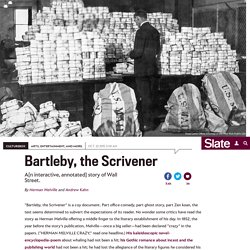
Part office comedy, part ghost story, part Zen koan, the text seems determined to subvert the expectations of its reader. No wonder some critics have read the story as Herman Melville offering a middle finger to the literary establishment of his day. In 1852, the year before the story’s publication, Melville—once a big seller—had been declared “crazy” in the papers. (“HERMAN MELVILLE CRAZY,” read one headline.) Geschichtsunterricht: Wie die Zeit aus der Geschichte verschwindet - Forschung und Lehre.
Wissenschaftliches online. Karrierewege digital. Foerdermittel digital. Personalentwicklung für den wissenschaftlichen Nachwuchs. Stifterverband für die Deutsche Wissenschaft. Start - Bundesverband Deutscher Stiftungen. Historikerverband. Deutsche Forschungsgemeinschaft. KISSWIN.de: KISSWIN. Career Advice From an Oldish Not-Quite Geezer. How Academia Resembles a Drug Gang. In 2000, economist Steven Levitt and sociologist Sudhir Venkatesh published an article in the Quarterly Journal of Economics about the internal wage structure of a Chicago drug gang.
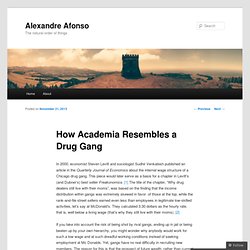
This piece would later serve as a basis for a chapter in Levitt’s (and Dubner’s) best seller Freakonomics. [1] The title of the chapter, “Why drug dealers still live with their moms”, was based on the finding that the income distribution within gangs was extremely skewed in favor of those at the top, while the rank-and-file street sellers earned even less than employees in legitimate low-skilled activities, let’s say at McDonald’s. They calculated 3.30 dollars as the hourly rate, that is, well below a living wage (that’s why they still live with their moms). [2] With a constant supply of new low-level drug sellers entering the market and ready to be exploited, drug lords can become increasingly rich without needing to distribute their wealth towards the bottom.
Academia as a Dual Labour Market. History shows: the humanities have vocational utility (essay) The current state and future prospects of the humanities are occasioning considerable anxious comment.
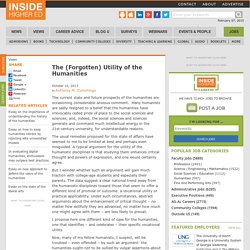
Many humanists are sadly resigned to a belief that the humanities have irrevocably ceded pride of place to the social sciences and sciences; and, indeed, the social sciences and sciences generate and command much intellectual energy in the 21st-century university, for understandable reasons. The usual remedies proposed for this state of affairs have seemed to me to be limited at best and perhaps even misguided. A typical argument for the utility of the humanistic disciplines is that studying them enhances critical thought and powers of expression, and one would certainly agree. But I wonder whether such an argument will gain much traction with college-age students and especially their parents. Oxford survey finds humanities degrees pay. Long-term study of alumni careers questions coalition’s STEM emphasis Source: Alamy Questionable figures: results of a study cast doubt on the government’s prioritisation of funds for science subjects The University of Oxford has used a study of its humanities graduates’ careers to question the government’s financial prioritisation of science students, a policy it claims was “formulated without an evidence base”.
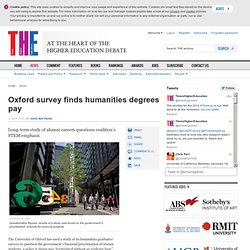
Oxford has tracked the fortunes of around 11,000 alumni who joined the university between 1960 and 1989 and concludes that they have played a growing role in emerging UK industrial sectors, particularly finance and law. Relying on salary data from graduates’ first jobs is “not a sound basis” for judging the impact of humanities degrees throughout alumni’s working lives, Humanities Graduates and the British Economy: The Hidden Impact argues. As Interest Fades in the Humanities, Colleges Worry. STANFORD, Calif. — On Stanford University’s sprawling campus, where a long palm-lined drive leads to manicured quads, humanities professors produce highly regarded scholarship on Renaissance French literature and the philosophy of language. De Vergeten Wetenschappen. De springlevende geesteswetenschap. Research Fundermentals: Peer Review & Changing a Lightbulb: a Historian's View.
This made me laugh and - like all the best jokes - has an underlying (bitter) truth to it.
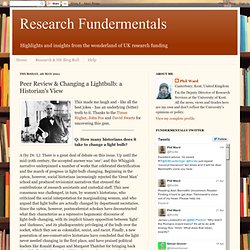
Thanks to the Times Higher, John Fea and David Swartz for uncovering this gem. Q: How many historians does it take to change a light bulb? A (by Dr. Der Mensch beginnt beim Lehrstuhlinhaber – Projekte : Zeitenspiegel Reportagen.